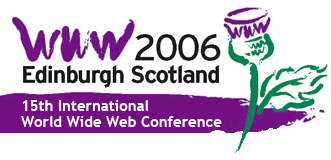Panels
Panels focus on emerging technologies, controversial issues, or unsolved problems in the World Wide Web community to stimulate lively, thoughtful, and sometimes provocative discussions. We expect the panelists to actively engage the audience and help them broaden their understanding of the issues.
Ron Brachman Dan Connolly Rohit Khare Frank Smadja Frank van Harmelen It is a truism that as the Web grows in size and scope, it becomes harder to find what we want, to identify like-minded people and communities, to find the best ads to offer, and to have applications work together smoothly. Services don't interoperate; queries yield long lists of results, most of which seem to miss the point. If the Web were a person, we would expect richer and more successful interactions with it - interactions that were, quite literally, more meaningful. That's because in human discourse, it is shared meaning that gives us real communication. Yet with the current Web, meaning cannot be found. Much recent work has aspired to change this, both for human-machine interchange and machine-machine synchronization. Certainly the "semantic web" looks to add meaning to our current simplistic matching of mere strings of characters against mere "bags" of words. But can we legislate meaning from on high? Isn't meaning organic and determined by use, a moving and context-dependent target? But if meaning is an evolving organic soup, how are humans able to get anything done with one another? Don't we love to "define our terms"? But then again, is real definition even possible? These questions have daunted philosophers for years, and we probably won't solve them here. But we'll try to understand what's at the root of our own current religious debate: should meaning on the Web be evolutionary, driven organically through the bottom-up human assignment of tags? Or does it need to be carefully crafted and managed by a higher authority, using structured representations with defined semantics? Without picket signs or violence (we hope), our panelists will explore the two extreme ends of the spectrum - and several points in between.
Arnaud Sahuguet Stefan Brands Kim Cameron Cahill Conor Aude Pichelin Fulup Ar Foll Mike Neuenschwander Since the early days of the Web, identity management has been a big issue. As the famous cartoon from the New Yorker reminds us, "on the internet, nobody knows you are a dog". This was true back in July 1993. This is true today. For the last few years, numerous initiatives have emerged to tackle this issue: Microsoft Passport, Liberty Alliance, 3GPP GUP, Shibboleth, to name a few. Major investments are being made in this area and this is foreseen as a multi-billion dollar market. Yet, as of this writing, there is still no widespread identity management infrastructure in place ready to be used by the general public on converged networks. The goal of this panel is to do a reality check and try to answer the following five questions: - What is identity management?
- Who needs identity management and why?
- What will the identity management ecosystem look like?
- What's agreed upon?
- What's next?
Rachna Dhamija Peter Cassidy Phillip Hallam-Baker Markus Jacobsson In the last few years, Internet users have seen the rapid expansion of "phishing", the use of spoofed e-mails and fraudulent websites designed to trick users into divulging sensitive data. More recently, we have seen the growth of "pharming", the use of malware or DNS-based attacks to misdirect users to rogue websites. In this panel, we will examine the state of the art in anti-phishing solutions and explore promising directions for future research.
Nigel Shadbolt Richard Benjamins Tim Berners-Lee Jim Hendler Clare Hart The World Wide Web has been revolutionary in terms of impact, scale and outreach. At every level society has been changed in some way by the Web. This Panel will consider likely developments in this extraordinary human construct as we attempt to realise the Next Wave of the Web - a Semantic Web. The discussion will focus on the prospects for the Semantic Web, its likely form and the challenges it faces. Can we achieve the necessary agreements on shared meaning for the Semantic Web? Can we achieve a critical mass of semantically annotated data and content? How are we to trust such content? Do the scientific and commercial drivers really demand a Semantic Web? How will the move to a mobile and ubiquitous Web affect the Semantic Web? How does Web 2.0 relate to the Semantic Web?
Mark Crocker Diego Anza Neil Edwards Paul Walsh Jonas Wilhelmsson
Souheil Badran Jonathan Armstrong Tom Ilube Mary Ellen Zurko
Chairs
- Marti Hearst, UC Berkeley, USA (Co-Vice Chair)
- Prabhakar Raghavan, Yahoo! Inc., and Stanford University, USA (Co-Vice Chair)
|

